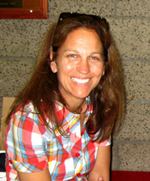As Diane Bock watched riots in South Central Los Angeles from her suburban San Diego home, she felt devastated, horrified, and helpless. "What," she asked herself over and over, "can one person possibly do about racial ignorance and hatred?" She dwelled on the question for months, until she realized that one person was the answer: "These walls were put up one brick at a time, and they have to be taken down that way too," says Bock. "One person at a time."
Seeing that people tend to stereotype races because they don't understand each other's worlds, she got to her next question: "If you have people whose universes never touch, how do you get them to connect?" Her answer was "Community Cousins," a non-profit organization she founded to give families of different races opportunities to get to know each other. Its plan, which Bock based on her relationship with her own cousins, is simple: two families are matched as "cousins" on the basis of shared interests, locale, and ages of their children. Once matched, the cousins are encouraged to do things together, but nothing is forced. Friendships develop as the families get together on their own terms—to share children's outgrown clothes and toys, to attend picnics, baseball games, holiday gatherings or the Community Cousins family events Bock hosts regularly.
Bock spends most of her time and a good deal of her own financial resources to keep Community Cousins going. She's been harassed and threatened for her efforts. But more disturbing to Bock—and more common—is people's lack of participation. Though many people agree Cousins is a good idea, few of them actually make the effort to get involved. And getting involved is the point. It's "nothing heroic in terms of time or commitment," says Bock, it's just a matter of "small doses spread over time." But Community Cousins is growing, slowly and steadily.
Beginning with a pilot group of 39 families, there came to be 101 families participating in the L.A. area. Bock's next goal is creating a Community Cousins handbook, so the idea can spread to other communities. Already two seedling efforts have been transplanted—one in Texas, another in Minnesota. Bock's dream is to provide, one by one, family by family, "The opportunity for one human to discover that another is not that different, that the 'they' is just us."

